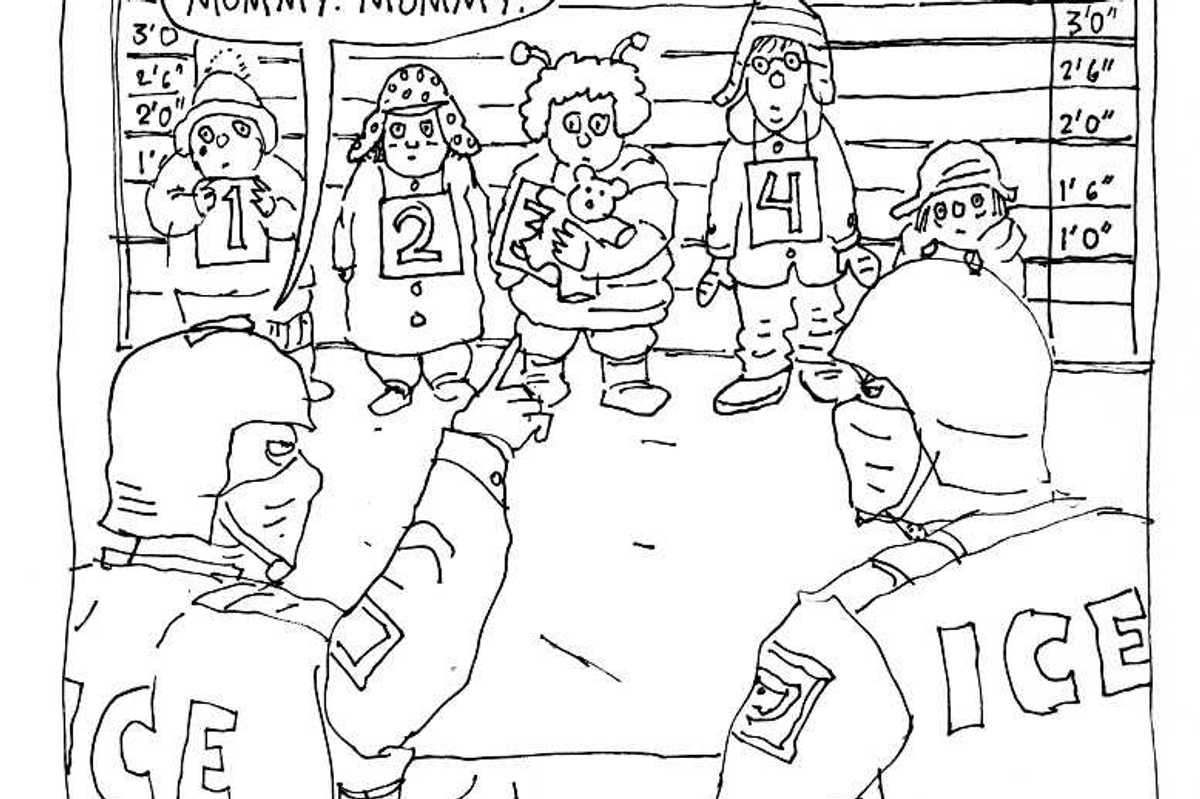Latest News
HVRHS’s Anthony Labbadia takes a jump shot in the game against Lakeview.
Riley Klein
FALLS VILLAGE — Back-to-back basketball games were played at Housatonic Valley Regional High School Friday, Feb. 13, against rival Lakeview High School.
The evening of excitement began with the girls varsity game and was followed by the boys game. Lakeview won them both with final scores of 46-26 for the girls and 72-36 for the boys.
It was a true rivalry atmosphere inside the Ed Tybursky Gym and cheering sections for both sides were full. In the home crowd, student commentators were situated courtside behind a mock ESPN sports desk.
The girls game was a physical battle with hard fouls from both sides. Athletic Trainer Erica Russell was quick to address injuries including a bloody nose and sprained thumb.

The score was close early on but as time marched on, Lakeview’s girls showed why they have only lost two games this season. Star guard Allie Pape scored a game-high 18 points for Lakeview. Addie Foss scored 11, Christina Barone scored 9, Micaela Rae scored 5, Dorothy Olmstead scored 2 and Alyssa Barone scored 1.
The HVRHS girls were led by Olivia Brooks with 8 points. Victoria Brooks scored 7, Maddy Johnson scored 6, Hayden Bachman scored 2, Carmela Egan scored 2 and Aubrey Funk scored 1.

In the boys game, HVRHS wore throwback jerseys complete with overly baggy shorts that were worn in the early 2000s. Two seniors were out due to injury: Wes Allyn was still recovering from knee surgery and Owen Riemer was in a sling due to a hyperextended elbow.
Lakeview built a lead early on and stayed ahead until the end. The Bobcats were led offensively by Jack Gollow with 35 points. Quinn Coffey scored 9, Chuck Pickert scored 6, Roch Bolton scored 6, Max Guma scored 5, Renaldi Mucka scored 4, Jovany Pirro scored 4, Henry Contadini scored 2 and Connor Aldrich scored 1.
HVRHS was led in scoring by Anthony Foley with 12 points. Anthony Labbadia scored 10, Simon Markow scored 6, Nick Crodelle scored 3, Wyatt Bayer scored 3 and Tyler Roberts scored 2.

After the results, Lakeview’s girls moved into first place in Berkshire League standings with a record of 16-2. The HVRHS girls were in fourth place, tied with Northwestern at 7-10.
For the boys, Lakeview remained in third place with a record of 11-6. The HVRHS boys moved to 4-13 in seventh place.
Keep ReadingShow less
East Mountain House appreciation
Many people may not yet know of a wonderful resource in Lakeville that made my husband’s recent death so much easier to bear, both for him and our family.East Mountain House on Bostwick Street is dedicated to caring for people in the end stage of life who can not be kept comfortable at home.
Their mission statement mirrors our experience:
“East Mountain House is an End-of-Life Care Home guided by intrinsic goodness. We are an inclusive, community-centered haven where guests and their loved ones find compassionate, personalized, end-of-life care and support.We restore dignity to the dying process, ensuring that every person is surrounded by kindness and respect, regardless of financial means.”
The house is home-like and cheerful, with sun streaming in and none of the cold clinical aspect of a hospital. The two bedrooms for ‘guests” are cozy and comfortable with ample chairs and sofas for family and friends to visit…even dog visits are allowed!Family can spend the night in this room, or in one of the rooms set aside for them upstairs.
The most important thing, however, is the hands-on care provided by the caregivers who are there day and night: warm, skilled, reassuring, deeply comforting.They made all the difference to my husband and my family.
We are so grateful to Keavy Bedell and Craig Davis for founding and continuing to care for this wonderful resource, to Cristin Rich, the Executive Director and to every member of the care-giving team.
Page Dickey
Falls Village
Postal workers thankful for clean pathways
The Postal Service would like to thank customers who cleared pathways to their mailboxes following the recent snowstorm that brought bitter cold temperatures and snow to Norfolk and surrounding areas.
I am incredibly proud of our hard-working employees who are dedicated to keeping the mail moving in inclement weather and are extremely grateful to our customers who put on some warm clothes, grabbed a shovel and a bag of salt to keep our carriers safe while delivering mail.
Our team is proud to serve Norfolk. With your continued shared effort during winter weather, we can keep service moving while looking out for one another.
I would like to personally thank our customers for their patience during the recent repairs to Norfolk Post Office. Your support meant the world to us.
Lastly, we would like to publicly thank Antonio Alcalá, art director for the USPS, and everyone who visited the Norfolk Library on Feb. 7 and 8 to hear about history of stamp making and to all the kids who participated in making their own stamps.
Community involvement is what makes this job so special.
Michelle Veronesi
Postmaster
Norfolk
Keep ReadingShow less

Want more of our stories on Google? Click here to make us a Preferred Source.
Classy and Naught
Feb 18, 2026
Let’s catch up with Melania Trump, who has spent less than 13% of her time in the White House since January 20, 2025. Rather she resides in personal privacy at Mar-a-Lago or in New York. At the White House traditional egg roll in 2025 — that’s coming up soon in 2026 — Melania was present, she is appropriately on Trump’s arm — part of the Presidential outfit — at White House dinners/state events.
Recently Jeff Bezos funded to the tune of $75 million “Melania: Twenty Days to History,” a documentary about Melania readying for the 2025 inauguration. The cast is prominently Melania, voice overs, with a few others silently or minimally on camera (Baron, Trump, her father, her dress designer). The documentary cost $40 million to produce, $35 million to market, for which Melania received $28 million, 70% of the production costs.How do those emolument clauses work?
The East Wing — where, since Eleanor Roosevelt’s reign, First Ladies have done their work — advanced social agendas, been advocates for kids, the elderly, women, minorities, health, education, human rights — is gapingly demolished.
Rosalyn Carter, in 1977, appointed a First Lady Chief of Staff; Rosalyn herself attended Cabinet meetings. From Lady Bird on, the First Lady staffs had been 15 +: using the First Lady’s platform for social issues via speeches, visits, organizing. Melania’s staff dropped to less than a dozen in T101. Now in T202, Melania’s staff is five. With the East Wing demolished there is no First Lady’s office, no place, no space and Be Best, Melania’s anti-cyberbullying initiative commenced in T101, is invisible, silent, oddly tuned with Trump’s online bully persona.
Woodrow Wilson’s stroke in 1919 put his second wife Edith in immense control of the Oval Office — some terming it “The Secret Presidency.” Then with Franklin Roosevelt’s election in 1932, Eleanor Roosevelt commenced her live long impact on the Presidency, the war, the country, rising to U.S. U.N. Delegate 1945 — 1953. Eleanor was prominent nationally and internationally for decades; Truman called her “the First Lady of the world” for her extended, substantial contribution to human rights.
In 1961, John Kennedy brought youth, sterling speech “ask not what your country can do for you, but you can do for your country”, a Russia crisis with Khrushchev and stunning Class to his presidency. Jackie Kennedy with her classy attire, her French (a polyglot fluent in French, Spanish and Italian), her cultural predilection all precipitated on their Paris visit to Kennedy’s “I am the man who accompanied Jacqueline Kennedy to Paris and I have enjoyed it.”
Jackie’s famed pillbox hat, small, centered atop her head, was diametrically opposed to Melania’s “boater” hat worn at the 2025 inauguration. Melania’s selection was seemingly a shield for her eyes, face from the people and, planned or not, a block for a Trump attempted kiss.
In 1962, Jaqueline Kennedy starred in CBS’S A Tour of the White House with Mrs. John F. Kennedy that was highly watched TV with 80 million, earning Jacqueline an honorary Emmy.This video showed the American people the renovated White House state rooms, under Jacqueline’s lead, with authentic, period-accurate furnishings — museum quality. The White House Historical Society, established in 1961, remains, thus far, a private, non-profit to protect, preserve and provide public access to the Executive Mansion.
First Ladies Johnson, Reagan, the Bushes, Clinton, Obama and Biden have all been visibly active using their platforms for social advancement — Clinton becoming an elected Senator, Secretary of State, and Presidential candidate. The East Wing did not make them prominent, influential, or active but it was there, acknowledged White House space. Its vacancy is significant.
The woman, Melania, wore a Zara jacket with huge lettering: “I Really Don’t Care, Do U?” on the back for her 2018 trip to visit a Texas detention center for immigrant children. Prominent in her recent in-theatre documentary are Melania’s ever present, ever-a-foot 5-inch stiletto heels -seemingly her personal symbol. Perhaps the elimination of the First Lady is being provoked by more than the demolishment of the East wing.
Kathy Herald-Marlowe lives in Sharon.
Keep ReadingShow less
If Connecticut’s next state budget can be considered a sort of poker game of tax cutting, Gov. Ned Lamont has opened with $500 million and the minority Republicans in the state Senate have seen his $500 million and raised him $1 billion.
But it’s not as hopeful for taxpayers as it looks.
The governor, a Democrat seeking election to a third term in November, proposes to spend $500 million to issue state tax “rebates” — $200 for single people and $400 for couples — a week ahead of Election Day. (If President Trump, a Republican, tried something like this, Democrats and most journalists would scream: “Bribery!”)
If things go according to what seems like the Democratic plan, soon after the election state residents will be hit with big increases in oil, gasoline, natural gas, and electricity prices as a result of a “climate superfund” tax many Democrats want to levy against energy producers to punish them for letting state residents use their fuels for the last century. Of course the energy producers won’t pay the tax by themselves; they’ll recover the cost by raising prices and the public will pay. But people will blame the energy producers, not the elected officials who enacted the tax and quickly took their “tax rebates” away.
The Republican senators, previously tribunes of fiscal responsibility, have counterproposed sharp reductions in the state income tax and property taxes on cars, $1.5 billion worth — reductions that might endure year after year.
The Republican senators also would eliminate state government’s “public benefits” charges on electric utility bills, which help to make Connecticut’s electricity prices nearly the highest in the country.
Sen. Ryan Fazio, R-Greenwich, a candidate for his party’s nomination for governor, says, “There is so much pork stuffed in our public benefits tax that it would boggle the mind — over 50 different government programs passed by the legislature and the governor over many years.”
Indeed, but Governor Lamont notes that some of the “public benefits” charges are not “pork.” They also pay for a guarantee of electricity supply from the Millstone nuclear power station in Waterford and for management of the regional electric grid. Some of the charges would be more honestly and transparently placed in the state budget and financed by general revenue rather than by what is essentially a sales tax on electricity, but they’d still have to be paid, and eliminating the “public benefits” tax won’t save as much money as Republicans imply.
So where is the rest of the money for the Republican tax relief to come from?
The Senate Republican leader, Brookfield’s Stephen Harding, says: “We have a $4 billion-plus ‘rainy-day fund.’ The people of the state have essentially been overtaxed by that much.”
Not really. This claim is wrong for the same reason Gov. Lamont, Democratic legislators, and state Comptroller Sean Scanlon are wrong when they claim that state government lately has produced balanced budgets with surpluses.
For the state employee and teacher pension funds are still underfunded by $35 billion or more, so the “rainy-day fund” and the supposed surpluses are really just borrowing from the pension funds and pushing their burdens deeper into the future, when they will thrust on taxpayers who weren’t even born when the pensioners were working, taxpayers who never benefited from the pensioners’ services.
When it comes to state budgeting and taxes, there are really only three ways of serving the public better: reducing the burden of government, improving services and making them more efficient, and eliminating the inessential. Connecticut fails badly in these respects.
The failure starts with state government’s failure to care about actual results. State government equates success with merely spending money even as important results worsen, including education, poverty, payroll control, and corruption. The Democrats can’t find anything to cut, especially since most failures profit Democrats, and the Republicans are too few and averse to being frank about the horrible.
Two-hundred-dollar “tax rebate” checks may help voters overlook failure but they won’t fix or improve anything.
Chris Powell has written about Connecticut government and politics for many years. (CPowell@cox.net)
Keep ReadingShow less

Want more of our stories on Google? Click here to make us a Preferred Source.
loading









The most powerful crime syndicate in history
It is time to acknowledge what has become tragically obvious: the Trump administration is essentially acting as a massive criminal enterprise. It lies, steals, extorts and murders – all while cloaked in the awesome authority of the state. It is on a crime spree that puts Al Capone to shame.
This is not hyperbole or hyperventilation. It is our reality, as the facts amply demonstrate. This administration has:
• Murdered Renee Good and Alex Pretti, slandered them as “domestic terrorists” and “assassins,” and allowed their killers to walk free;
• Unleashed thousands of minimally trained ICE agents, recruited with explicitly white supremacist messaging, to inflict terror on people of color;
• Repeatedly violated the constitutional rights of citizens and non-citizens by arresting them for First Amendment-protected speech, raiding their homes without judicial warrants, and imprisoning them without due process;
• Killed dozens of civilians on the high seas solely on the unsubstantiated claim that they were drug runners (not that being drug runners would justify their summary executions without due process anyway);
• Released hundreds of imprisoned felons who brutally beat Capitol police officers on January 6;
• Converted the once-independent Department of Justice into an instrument of personal retribution via the prosecution of cooked-up lawsuits against the President’s enemies;
• Threatened to seize the territory of a sovereign nation (a NATO ally no less);
• Sought to imprison United States Senators simply for exercising their free speech rights by reminding military personnel of their undisputed duty to disobey illegal orders;
• Tried to impose ruinous and unconstitutional sanctions on some of the country’s largest law firms simply because Trump doesn’t like them;
• Violated court orders on a massive scale. As the Chief District Judge of Minnesota recently wrote, “ICE has likely violated more court orders in January 2026 than some federal agencies have violated in their entire existence;”
• Shaken down some of the country’s largest universities by illegally threatening to withhold funding; and
• Engaged in breathtaking corruption: as the conservative writer David Frum stated, “Trump’s scale of stealing and bribe-taking has never been remotely paralleled in any democratic country ever before.”
And that’s just for starters; there are dozens more examples.
It is difficult to comprehend the level of state-sponsored criminality we are witnessing because our country has never experienced anything like it. It is also difficult to absorb because it is happening so quickly, and on so many different fronts. In the words of the 2022 movie, it sometimes feels like “Everything Everywhere All At Once.” And that can be exhausting, numbing, and overwhelming.
But viewing the Trump administration as a massive crime syndicate allows us to be clear-eyed about what is coming down the road, and to plan accordingly. To take the most urgent example, there ought to be no question as to whether Trump will try to steal the midterm elections. Of course he will try to steal them. Criminals gonna crime. He tried to steal the 2020 elections, and the lack of any consequences for that supremely traitorous act only further emboldened him. It is every patriotic American’s duty to oppose the coming effort to nullify the will of the voters.
That this administration can reasonably be viewed as a criminal enterprise should not be cause for despair. The courts have rejected many of the administration’s power grabs and unconstitutional or illegal acts. The President is less popular than he has ever been. Prominent Republicans are defying him more than ever. The brave citizens of Minneapolis are showing us how effective organized resistance can be. And Bad Bunny, with his Super Bowl message that “The only thing more powerful than hate is love,” gave us reason to believe that kindness, compassion and decency will prevail.
James Speyer is a lawyer and a volunteer for Lawyers Defending American. He lives in Sharon.